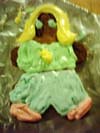(Welp, I didn't make it into Cannonball Read, but it's still a good goal to pursue. If I make it, maybe I'll donate some money)
I’m irritated that I have to return this novel to the library at work. It’s been gone too long and its absence might be noticed.
My place of employment’s library is filled with brown books, thick books. Books whose innards haven’t seen the light of day in years. Books that lend that particular musty scent to a room that already smells of mildew and fluorescent lighting. It is a room full of ancient learning and one that I occasionally peruse when a group isn’t in there.
I found this book hidden amongst the brown like a little green leaf. It’s a little out of place—you don’t see many Indian authors side-by-side with Rashi, Maimonides, and Uris. So I took it and smuggled it back to my desk. And now that it’s time to return it, I’m hesitant.
The God of Small Things time travels through the lives and histories of Estha and Rahel, a pair of fraternal twins, in their small Indian village. Through them, we see a rise of a family of industry amidst a population that is still painfully poor. Then, in Flannery O’Conner-esque turn of events, we see the high brought low and an ordered world churned into chaos. A family may be at the story’s heart, but it is the history of India and the impossibilities of progress with a rigid caste system are the veins and arteries.
The God of Small Things is a novel that is meant to be read twice in quick succession. It’s not thick—a mere 321 pages—and it doesn’t ask me to explore Newtonian physics, but it does ask to be read more than once. John Updike commented in The New Yorker that it’s “[a] novel of real ambition that must invent its own language.” Roy realizes that English cannot adequately portray the thoughts of a child or a translation of a foreign tongue. She incises nouns like a plastic surgeon and grafts in adjectives, creating words that, like a crooked nose suddenly made straight, you wonder how the English language ever existed before its creation. She forces our mother tongue into concepts not made for our culture—and she makes us understand.
Reading in what essentially becomes a foreign language is not simple for those who just expected to read a story about Indian culture. I re-read the introduction about four times and only grasped every detail by the final read. I finally realized that I could never make it through the book if I continued backtracking, so I plunged ahead like a jungle explorer. I finished—but at what cost? There are many sentences tittering in my wake, mocking my unseemly and unEnglishmajorly haste. So I’ll have to read it again.
But first I’ll have to put it back amongst the brown truck books, a little green leaf resting on the forest floor.
Rating (from bookstore to torrent): Bookstore
(Argh, verbose books make me verbose.)
Sunday, November 01, 2009
Subscribe to:
Post Comments (Atom)








You were supposed to be included on the official list, and now you are, because it was my oversight. Lucky #102!!!
ReplyDelete